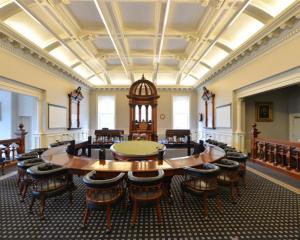The clamour against the Dunedin City Council harbourside district plan changes is louder than a foundry hammer.
Businesses in the area are alarmed and upset and are being backed in an extraordinarily strong show of support by the Otago Chamber of Commerce and other firms around the city.
The businesses fear that changes to a mixed "harbourside" zone will kill them off, whether it be quickly or - as one manager said - by a thousand cuts.
Gone will be the security of industrial zoning rights to underpin current operations and possible expansion.
Instead, "reverse sensitivity" from cafe owners and apartment dwellers about noises, fumes or smells seem inevitable, whatever the assurances.
The council can cogently argue that it can help firms shift if necessary, and that any concerns are alarmist.
The vision for a vibrant waterfront and surrounding area is for 50 years, and nothing is going to happen quickly.
Companies retain the right to operate and they are valued.
Nevertheless, the businesses are convinced that the full plan would undermine their existence.
Such is their vehemence, and such is their head of steam, that the belief could well become self-fulfilling.
Given the recession, the closing of Fisher and Paykel's Mosgiel factory and the competitive nature of these type of enterprises, some are already on the edge of survival.
It will take very little to push them over.
What is at stake, therefore, are jobs in the hand - perhaps as many as 200.
What is more, many are "real" jobs, bringing money into Dunedin, and many are supported by the cluster of metal industries located close together, close to town and close to the port.
By comparison, any harbourside jobs in cafe and restaurants might simply churn positions from elsewhere in the city.
In the long run, an appealing harbourside could add to Dunedin's ambience and reputation and attract more residents and visitors to the city.
But that is a maybe for the future, compared with a distinct risk to jobs here and now.
Further, some of the current engineering businesses are well placed to bolster Dunedin's case as the Southern Ocean oil exploration and exploitation support hub.
They are then well placed to take advantage of such development, and scope could be needed for more complementary industry in this actual vicinity.
While it is all very well to yearn for "creative" and non-industrial employment, Dunedin remains desperate for diversification and additional jobs if it is to avoid stagnation and a growing and dangerous over-reliance on just the university.
The council and its opponents are heading for a late April date with the Environment Court, a costly affair with likely winners and losers.
In the meantime, arbitration is taking place between Cr Colin Weatherall and businesses to try to find common ground.
Crucially, the council meets on Monday to consider a notice of motion to abandon stage 2 of the rezoning.
Much as it may be galling to change tack, the council should feel impelled to follow that course.
Stage 1, which is close to the wharves themselves, should go ahead.
It is extensive enough for prospective development for many years, especially because council budgets will be acutely strained in the foreseeable future.
At the same time, any temptation to simply put off stage 2 for a few years must be emphatically rejected because decisions delayed will fail to provide the confidence and certainty necessary for business consolidation and investment (perhaps, however, in say 15 to 20 years, some companies might have gone.
There would then be the opportunity to revisit the issue without threatening employment).
It is time, too, that the council and councillors give up the nonsense about not commenting because the matter is before the Environment Court.
Although the court might eventually decide the issues of law involved, its judges should be uninfluenced by outside debate and the matter is obviously not criminal.
It is, in fact, intensely political, and councillors are local politicians.
These are the very types of concerns that should be debated.
The Chamber of Commerce has pointed out that the Environment Court itself encourages such discussion.
Ridiculously, councillors are due to consider the issue, in this matter of intense public interest and importance, in private.
While the full harbourside concept is, and has been, a promising ideal, it has run into headwinds more powerful than a harbour nor'easter.
Faced with vociferous opposition and the threat to here-and-now jobs, it behoves councillors to behave like the politicians they are and respond to their constituents.
Sometimes they need to lead, and sometimes they need to listen.
In this case, they must take notice, and drop stage 2.












